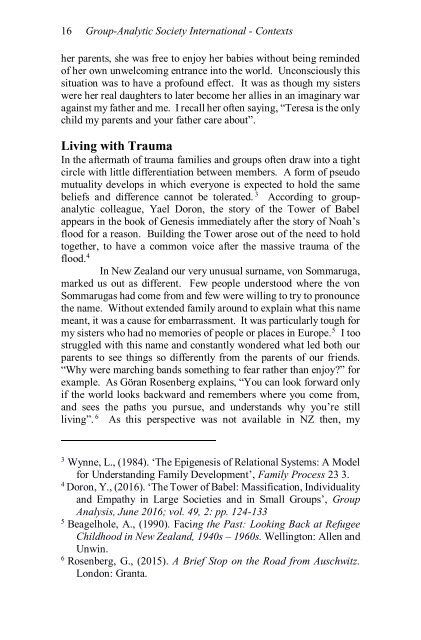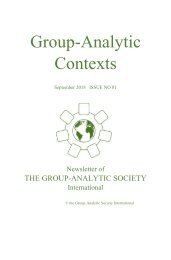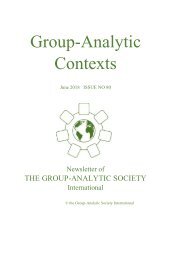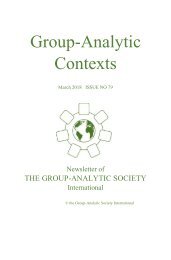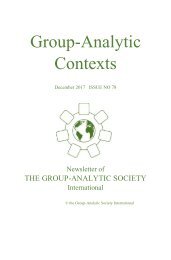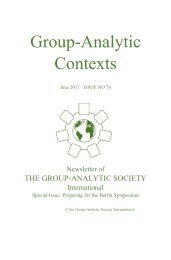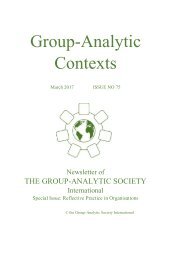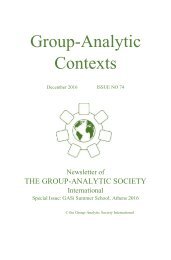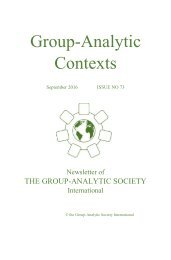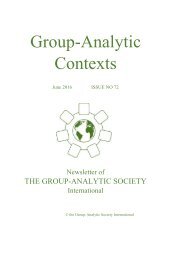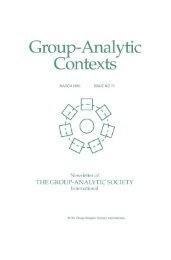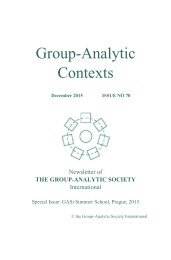Group Analytic Contexts, Issue 77, September 2017
Newsletter of the Group Analytic Society International
Newsletter of the Group Analytic Society International
Create successful ePaper yourself
Turn your PDF publications into a flip-book with our unique Google optimized e-Paper software.
16 <strong>Group</strong>-<strong>Analytic</strong> Society International - <strong>Contexts</strong><br />
her parents, she was free to enjoy her babies without being reminded<br />
of her own unwelcoming entrance into the world. Unconsciously this<br />
situation was to have a profound effect. It was as though my sisters<br />
were her real daughters to later become her allies in an imaginary war<br />
against my father and me. I recall her often saying, “Teresa is the only<br />
child my parents and your father care about”.<br />
Living with Trauma<br />
In the aftermath of trauma families and groups often draw into a tight<br />
circle with little differentiation between members. A form of pseudo<br />
mutuality develops in which everyone is expected to hold the same<br />
beliefs and difference cannot be tolerated. 3 According to groupanalytic<br />
colleague, Yael Doron, the story of the Tower of Babel<br />
appears in the book of Genesis immediately after the story of Noah’s<br />
flood for a reason. Building the Tower arose out of the need to hold<br />
together, to have a common voice after the massive trauma of the<br />
flood. 4<br />
In New Zealand our very unusual surname, von Sommaruga,<br />
marked us out as different. Few people understood where the von<br />
Sommarugas had come from and few were willing to try to pronounce<br />
the name. Without extended family around to explain what this name<br />
meant, it was a cause for embarrassment. It was particularly tough for<br />
my sisters who had no memories of people or places in Europe. 5 I too<br />
struggled with this name and constantly wondered what led both our<br />
parents to see things so differently from the parents of our friends.<br />
“Why were marching bands something to fear rather than enjoy?” for<br />
example. As Göran Rosenberg explains, “You can look forward only<br />
if the world looks backward and remembers where you come from,<br />
and sees the paths you pursue, and understands why you’re still<br />
living”. 6 As this perspective was not available in NZ then, my<br />
3<br />
Wynne, L., (1984). ‘The Epigenesis of Relational Systems: A Model<br />
for Understanding Family Development’, Family Process 23 3.<br />
4<br />
Doron, Y., (2016). ‘The Tower of Babel: Massification, Individuality<br />
and Empathy in Large Societies and in Small <strong>Group</strong>s’, <strong>Group</strong><br />
Analysis, June 2016; vol. 49, 2: pp. 124-133<br />
5<br />
Beagelhole, A., (1990). Facing the Past: Looking Back at Refugee<br />
Childhood in New Zealand, 1940s – 1960s. Wellington: Allen and<br />
Unwin.<br />
6<br />
Rosenberg, G., (2015). A Brief Stop on the Road from Auschwitz.<br />
London: Granta.


